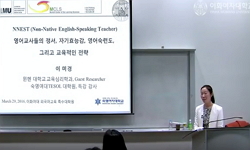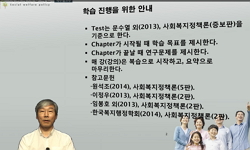The purpose of this study is to verify the impact of resilience on job satisfaction among caregivers in elderly care facilities and the mediating effect of self-efficacy. By examining the resilience perceived by caregivers, this study aims to provide ...
http://chineseinput.net/에서 pinyin(병음)방식으로 중국어를 변환할 수 있습니다.
변환된 중국어를 복사하여 사용하시면 됩니다.
- 中文 을 입력하시려면 zhongwen을 입력하시고 space를누르시면됩니다.
- 北京 을 입력하시려면 beijing을 입력하시고 space를 누르시면 됩니다.
노인요양시설 요양보호사의 회복탄력성이 직무만족에 미치는 영향 : - 자기효능감의 매개효과를 중심으로 - = The Effect of Resilience on Job Satisfaction among Caregivers in Elderly Care Facilities : Focusing on the Mediating Effect of Self-Efficacy
한글로보기https://www.riss.kr/link?id=T17151250
- 저자
-
발행사항
경기 : 신한대학교 일반대학원(박사), 2025
-
학위논문사항
학위논문(박사) -- 신한대학교 일반대학원(박사) , 사회복지학과 사회복지실천 , 2025. 2
-
발행연도
2025
-
작성언어
한국어
- 주제어
-
발행국(도시)
경기도
-
형태사항
131 ; 26 cm
-
일반주기명
지도교수: 임원선
-
UCI식별코드
I804:41089-200000845183
- 소장기관
-
0
상세조회 -
0
다운로드
부가정보
다국어 초록 (Multilingual Abstract)
This study targeted caregivers working in elderly care facilities located in Seoul and Gyeonggi Province, distributing a total of 400 questionnaires. The survey was conducted via a self-reporting method, and data collection was carried out over a period of approximately four weeks from July 17 to August 12, 2024. All 400 questionnaires were retrieved (response rate: 100%), and after excluding 5 incomplete or unreliable responses, a total of 395 valid questionnaires (effective response rate: 98.8%) were analyzed using SPSS 25.0.
The key findings of the study are as follows:
Resilience has a positive (+) impact on self-efficacy.
This hypothesis was supported, indicating that caregivers with high resilience are more likely to trust their abilities and actively respond to challenges with increased self-efficacy. These findings highlight the need for programs aimed at improving resilience to enhance caregivers’ sense of efficacy.
Resilience positively (+) affects goal-setting.
This hypothesis was supported, demonstrating that caregivers with higher resilience show a positive impact on setting specific and actionable goals for planning and execution of tasks.
Resilience positively (+) influences problem-solving.
Caregivers with higher resilience exhibit a strong willingness and proactive approach to solving problems encountered during work.
Resilience positively (+) impacts judgment.
This hypothesis was supported, indicating that caregivers with high resilience are more likely to make better judgments in work situations. Improved judgment contributes to enhancing work capabilities and efficiency.
Resilience positively (+) influences job satisfaction.
Caregivers with strong resilience reported higher job satisfaction, suggesting that resilience improves positive perceptions and satisfaction within the work environment. The study emphasizes the necessity of programs to support caregivers’ resilience.
Resilience positively (+) affects intrinsic job satisfaction.
Resilient caregivers tend to exhibit a more positive attitude toward job performance and experience greater satisfaction. This result underscores the need for psychological support to help caregivers maintain a positive outlook on their roles.
Resilience positively (+) impacts job stability.
Resilience contributes to fostering a sense of psychological stability in caregivers regarding their jobs, indicating the importance of support mechanisms to enhance this stability.
Resilience positively (+) influences individual characteristics.
Resilience leads to positive changes in caregivers’ personal traits and characteristics, emphasizing the need for strategies to develop and leverage individual attributes.
Self-efficacy has a partial positive (+) effect on job satisfaction.
Although self-efficacy affects job satisfaction, it does not show significant correlations across all variables. The study suggests the necessity of additional training and education to enhance caregivers’ self-efficacy.
Self-efficacy positively (+) influences intrinsic job satisfaction.
This hypothesis was partially supported, showing that self-efficacy has some positive impact on intrinsic job satisfaction, though not consistently across all respondents. This highlights the need for programs to strengthen self-efficacy further.
Self-efficacy mediates the relationship between resilience and job satisfaction.
The mediating role of self-efficacy between resilience and job satisfaction was confirmed. Self-efficacy acts as a mediator, enhancing the positive relationship between the two variables and further promoting job satisfaction.
In conclusion, this study analyzed the impact of resilience and self-efficacy on job satisfaction among caregivers in elderly care facilities and verified the mediating effect of self-efficacy. The findings confirm that resilience significantly influences self-efficacy and job satisfaction and that self-efficacy mediates this relationship.
By exploring the relationship between resilience, self-efficacy, and job satisfaction, the study emphasizes the need for programs aimed at supporting caregivers’ psychological well-being. This research highlights the necessity of a multifaceted approach to improving job satisfaction through enhanced resilience and self-efficacy.
The purpose of this study is to verify the impact of resilience on job satisfaction among caregivers in elderly care facilities and the mediating effect of self-efficacy. By examining the resilience perceived by caregivers, this study aims to provide practical strategies to enhance their job satisfaction and serve as foundational data for application in elderly care facilities.
This study targeted caregivers working in elderly care facilities located in Seoul and Gyeonggi Province, distributing a total of 400 questionnaires. The survey was conducted via a self-reporting method, and data collection was carried out over a period of approximately four weeks from July 17 to August 12, 2024. All 400 questionnaires were retrieved (response rate: 100%), and after excluding 5 incomplete or unreliable responses, a total of 395 valid questionnaires (effective response rate: 98.8%) were analyzed using SPSS 25.0.
The key findings of the study are as follows:
Resilience has a positive (+) impact on self-efficacy.
This hypothesis was supported, indicating that caregivers with high resilience are more likely to trust their abilities and actively respond to challenges with increased self-efficacy. These findings highlight the need for programs aimed at improving resilience to enhance caregivers’ sense of efficacy.
Resilience positively (+) affects goal-setting.
This hypothesis was supported, demonstrating that caregivers with higher resilience show a positive impact on setting specific and actionable goals for planning and execution of tasks.
Resilience positively (+) influences problem-solving.
Caregivers with higher resilience exhibit a strong willingness and proactive approach to solving problems encountered during work.
Resilience positively (+) impacts judgment.
This hypothesis was supported, indicating that caregivers with high resilience are more likely to make better judgments in work situations. Improved judgment contributes to enhancing work capabilities and efficiency.
Resilience positively (+) influences job satisfaction.
Caregivers with strong resilience reported higher job satisfaction, suggesting that resilience improves positive perceptions and satisfaction within the work environment. The study emphasizes the necessity of programs to support caregivers’ resilience.
Resilience positively (+) affects intrinsic job satisfaction.
Resilient caregivers tend to exhibit a more positive attitude toward job performance and experience greater satisfaction. This result underscores the need for psychological support to help caregivers maintain a positive outlook on their roles.
Resilience positively (+) impacts job stability.
Resilience contributes to fostering a sense of psychological stability in caregivers regarding their jobs, indicating the importance of support mechanisms to enhance this stability.
Resilience positively (+) influences individual characteristics.
Resilience leads to positive changes in caregivers’ personal traits and characteristics, emphasizing the need for strategies to develop and leverage individual attributes.
Self-efficacy has a partial positive (+) effect on job satisfaction.
Although self-efficacy affects job satisfaction, it does not show significant correlations across all variables. The study suggests the necessity of additional training and education to enhance caregivers’ self-efficacy.
Self-efficacy positively (+) influences intrinsic job satisfaction.
This hypothesis was partially supported, showing that self-efficacy has some positive impact on intrinsic job satisfaction, though not consistently across all respondents. This highlights the need for programs to strengthen self-efficacy further.
Self-efficacy mediates the relationship between resilience and job satisfaction.
The mediating role of self-efficacy between resilience and job satisfaction was confirmed. Self-efficacy acts as a mediator, enhancing the positive relationship between the two variables and further promoting job satisfaction.
In conclusion, this study analyzed the impact of resilience and self-efficacy on job satisfaction among caregivers in elderly care facilities and verified the mediating effect of self-efficacy. The findings confirm that resilience significantly influences self-efficacy and job satisfaction and that self-efficacy mediates this relationship.
By exploring the relationship between resilience, self-efficacy, and job satisfaction, the study emphasizes the need for programs aimed at supporting caregivers’ psychological well-being. This research highlights the necessity of a multifaceted approach to improving job satisfaction through enhanced resilience and self-efficacy.
국문 초록 (Abstract)
노인요양시설 요양보호사의 회복탄력성이 직무만족에 미치는 영향 - 자기효능감의 매개효과를 중심으로 - 본 연구의 목적은 노인요양시설 요양보호사의 회복탄력성이 직무만족에 미 치는 ...
노인요양시설 요양보호사의 회복탄력성이 직무만족에 미치는 영향 - 자기효능감의 매개효과를 중심으로 - 본 연구의 목적은 노인요양시설 요양보호사의 회복탄력성이 직무만족에 미 치는 영향과 자기효능감의 매개효과를 검증하여 노인요양시설 요양보호사들이 인지하는 회복탄력성을 확인하고, 요양보호사들의 직무만족을 향상시키기 위한 실천적 방안마련과 노인요양시설 현장에서 활용될 수 있는 기초자료로 제공하 는데 목적이 있다. 본 연구 대상은 서울특별시, 경기도 소재하고 있는 노인요양시설에 근무하는 요양보호사들을 대상으로 400부를 설문으로 배포하여 실시하였다. 요양보호사 들이 자기기입방식으로 작성한 설문지를 회수하는 방식으로 이루어졌다. 본 연 구 측정 설문은 2024년 7월17일부터 2024년 8월12일까지 약 4주에 걸쳐 실시하 였다. 총 400부를 배포하고 400부가 회수되었으며(회수율 : 100%), 그 중 응답 내용이 부실하거나, 신뢰성이 없고 과도한 결측값으로 판단되는 5부를 제외한 총 395부(유효회수율 : 98.8%)를 SPSS 25.0을 사용하여 최종 검증하였다. 본 연구의 주요 분석 결과는 다음과 같다. 노인요양시설 요양보호사의 회복탄력성은 자기효능감에 정(+)의 영향을 미칠 것이다. 이 가설은 채택되었으며, 회복탄력성이 높은 요양보호사는 스스로의 능 력을 더 신뢰하고, 도전에 적극적으로 대응하려는 자기효능감을 가지게 됨을 시 사한다. 이러한 결과가 요양보호사들의 자기효능감 향상을 위한 회복탄력성 증 진 프로그램의 필요성을 시사한다. 노인요양시설 요양보호사의 회복탄력성은 계획목표설정에 정(+)의 영향을 미 칠 것이다. 이 가설은 채택되었고, 요양보호사들이 회복탄력성을 통해 목표 설 정에 긍정적인 영향을 받고 있으며, 이는 업무 계획과 실행을 위한 구체적인 목 표 수립이 가능함을 나타낸다. 노인요양시설 요양보호사의 회복탄력성은 도전해결에 정(+)의 영향을 미칠 것 이다. 이 가설 또한 채택되었다. 회복탄력성 있는 요양보호사는 업무 중 발생하 는 문제를 해결하려는 의지가 높아지고 적극적으로 대처하려는 성향을 보인다. 노인요양시설 요양보호사의 회복탄력성은 판단력에 정(+)의 영향을 미칠 것이 다. 이 가설은 채택되었으며, 회복탄력성이 높은 요양보호사는 직무 상황에서 더 나은 판단을 내릴 가능성이 크다. 판단력 향상이 요양보호사의 업무 능력 향상 및 직무 효율성 증대에 기여할 것이라 제언한다. 노인요양시설 요양보호사의 회복탄력성은 직무만족에 정(+)의 영향을 미칠 것 이다. 이 가설은 채택되었다. 회복탄력성이 강한 요양보호사는 직무만족이 높게 나타났으며, 이는 회복탄력성 향상이 직무 환경 내 긍정적 인식과 만족도를 높 이는 요인임을 보여준다. 요양보호사의 회복탄력성을 지원하는 프로그램이 필 수적임을 강조한다. 노인요양시설 요양보호사의 회복탄력성은 직무자체 만족도에 정(+)의 영향을 미칠 것이다. 이 가설 또한 채택되었다. 회복탄력성이 높은 요양보호사는 직무 수행에 긍정적인 자세를 가지고 더 나은 만족감을 가지는 경향이 있다. 이러한 결과가 요양보호사의 긍정적 직무자체를 유지하기 위한 심리적 지원이 필요함 을 시사한다. 노인요양시설 요양보호사의 회복탄력성은 직업안정성에 정(+)의 영향을 미칠 것이다. 이 가설은 채택되었으며, 회복탄력성이 직업 안정성에 긍정적인 영향을 미친다는 점은 요양보호사가 직무에 대한 심리적 안정감을 느낄 수 있도록 돕 는 요인이 필요함을 암시한다. 노인요양시설 요양보호사의 회복탄력성은 개인적 특성에 정(+)의 영향을 미칠 것이다. 이 가설도 채택되었다. 회복탄력성이 요양보호사 개인의 성향 및 특성 에 긍정적인 변화를 유도하는 것으로 나타났다. 요양보호사의 직무에 대한 개 별적 성향을 이해하고 이를 발전시킬 수 있는 방안의 필요성을 언급한다. 노인요양시설 요양보호사의 자기효능감은 직무만족에 정(+)의 영향을 미칠 것 이다. 이 가설은 부분적으로 채택되었으며, 자기효능감은 직무만족에 영향을 미 치지만 모든 요인에서 유의미한 상관관계를 나타내지는 않았다. 요양보호사들 의 자기효능감 증진을 위한 직무 교육과 훈련이 필요함을 제안한다. 노인요양시설 요양보호사의 자기효능감은 직무자체 만족도에 정(+)의 영향을 미칠 것이다. 부분 채택된 이 가설은, 자기효능감이 직무자체 만족도에 일정 부 분 긍정적 영향을 미친다는 점을 보여주었지만, 통계적으로 모든 응답자에서 일 관된 영향을 미치지 못하는 점에서 향후 추가적 연구가 필요함을 시사한다. 노인요양시설 요양보호사의 자기효능감은 회복탄력성과 직무만족 간에 매개효 과를 보일 것이다. 채택된 이 가설은 자기효능감이 회복탄력성과 직무만족 사 이에서 매개효과를 가지며, 두 변수의 관계에 긍정적 영향을 미치는 중재 역할 을 할 수 있음을 보여주고, 본 연구는 회복탄력성과 자기효능감 간의 연계성이 직무만족을 더욱 촉진할 수 있음을 강조한다. 본 연구는 노인요양시설 요양보호사의 회복탄력성과 자기효능감이 직무만족에 미 치는 영향을 분석하고, 자기효능감의 매개효과를 검증하였다. 가설 검증 결과, 회 복탄력성이 자기효능감 및 직무만족에 유의한 정(+)의 영향을 미치며, 자기효능감 은 직무만족을 증대시키는 데 있어 회복탄력성과의 관계에서 매개 역할을 수행하 는 것으로 확인되었다. 이와 같이 노인요양시설 요양보호사의 회복탄력성과 자기효능감이 직무만족에 미 치는 영향을 탐구함으로써 요양보호사의 심리적 안정을 돕기 위한 프로그램 개발 의 필요성을 제기한다. 회복탄력성을 통한 직무효능감 향상과 더불어 자기효능감 의 매개효과를 확인한 이 연구는 요양보호사의 직무만족을 높이기 위한 다각적인 접근이 필요하다는 점을 시사한다. * 주제어 : 직무만족, 회복탄력성, 자기효능감, 요양보호사
목차 (Table of Contents)
- 제 1 장 서 론 1
- 1. 연구배경 1
- 2. 연구의 필요성 3
- 3. 연구목적 5
- 제 2 장 이론적 배경 8
- 제 1 장 서 론 1
- 1. 연구배경 1
- 2. 연구의 필요성 3
- 3. 연구목적 5
- 제 2 장 이론적 배경 8
- 1. 직무만족8
- 1) 직무만족의 개념8
- 2) 직무만족 중요성 11
- 3) 직무만족의 구성요인 13
- 4) 직무만족에 영향을 미치는 요인15
- 2. 회복탄력성 21
- 1) 회복탄력성의 개념21
- 2) 회복탄력성의 구성요인 25
- 3. 자기효능감 27
- 1) 자기효능감의 개념27
- 2) 자기효능감의 구성요인 31
- 4. 요양보호사 34
- 1) 요양보호사의 개념34
- 2) 요양보호사의 직무 및 역할 36
- 3) 요양보호사의 요양서비스 분류 39
- 4) 요양보호사의 요양서비스 제공원칙 40
- 5) 요양보호사의 근무환경 현황42
- 5. 선행연구 고찰 43
- 1) 회복탄력성과 직무만족 관계43
- 2) 회복탄력성과 자기효능감 관계 44
- 3) 자기효능감과 직무만족 관계46
- 4) 회복탄력성, 자기효능감, 직무만족 관계 47
- 제 3 장 연구 방법 49
- 1. 연구모형49
- 2. 연구절차50
- 3. 연구가설51
- 4. 연구대상 및 자료수집52
- 5. 분석방법54
- 6. 측정도구의 타당도와 신뢰도 분석 55
- 1) 타당도 분석55
- 2) 신뢰도 검증60
- 제 4 장 연구 결과 62
- 1. 주요변수의 특성 62
- 2. 응답자의 일반적 사항에 따른 직무만족 차이 63
- 3. 응답자의 일반적 사항에 따른 회복탄력성 차이 65
- 4. 응답자의 일반적 사항에 따른 자기효능감 차이 67
- 5. 주요변수 간의 상관관계 69
- 6. 가설의 검증71
- 7. 가설검증 결과 요약 99
- 제 5 장 결 론 100
- 1. 연구결과 요약 및 논의100
- 1) 연구결과 요약100
- 2) 논의 101
- 2. 함의 및 제언101
- 1) 이론적 함의 및 제언 101
- 2) 정책적 함의 및 제언 104
- 3) 실천적 함의 및 제언 107
- 3. 연구의 한계 및 후속 연구를 위한 제언 110
- 참고문헌 111
- 부 록 124
- Abstract 129











